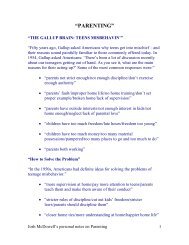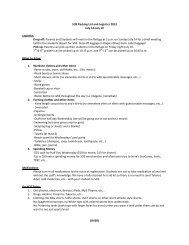Pdf Copy of Orthodoxy, by G.K. Chesterton - Christ United Methodist ...
Pdf Copy of Orthodoxy, by G.K. Chesterton - Christ United Methodist ...
Pdf Copy of Orthodoxy, by G.K. Chesterton - Christ United Methodist ...
You also want an ePaper? Increase the reach of your titles
YUMPU automatically turns print PDFs into web optimized ePapers that Google loves.
9/ 27/ 12 The Pr oject G ut enber g eBook <strong>of</strong> O r t hodoxy, G . K. Chest er t on<br />
www. gut enber g. or g/ f iles/ 16769/ 16769- h/ 16769- h. ht m<br />
destroyed half his joys. By asking for pleasure, he lost the chief pleasure; for the chief<br />
pleasure is surprise. Hence it became evident that if a man would make his world large, he<br />
must be always making himself small. Even the haughty visions, the tall cities, and the<br />
toppling pinnacles are the creations <strong>of</strong> humility. Giants that tread down forests like grass are<br />
the creations <strong>of</strong> humility. Towers that vanish upwards above the loneliest star are the<br />
creations <strong>of</strong> humility. For towers are not tall unless we look up at them; and giants are not<br />
giants unless they are larger than we. All this gigantesque imagination, which is, perhaps, the<br />
mightiest <strong>of</strong> the pleasures <strong>of</strong> man, is at bottom entirely humble. It is impossible without<br />
humility to enjoy anything—even pride.<br />
But what we suffer from to-day is humility in the wrong place. Modesty has moved from the<br />
organ <strong>of</strong> ambition. Modesty has settled upon the organ <strong>of</strong> conviction; where it was never<br />
meant to be. A man was meant to be doubtful about himself, but undoubting about the truth;<br />
this has been exactly reversed. Nowadays the part <strong>of</strong> a man that a man does assert is<br />
exactly the part he ought not to assert—himself. The part he doubts is exactly the part he<br />
ought not to doubt—the Divine Reason. Huxley preached a humility content to learn from<br />
Nature. But the new sceptic is so humble that he doubts if he can even learn. Thus we<br />
should be wrong if we had said hastily that there is no humility typical <strong>of</strong> our time. The truth<br />
is that there is a real humility typical <strong>of</strong> our time; but it so happens that it is practically a more<br />
poisonous humility than the wildest prostrations <strong>of</strong> the ascetic. The old humility was a spur<br />
that prevented a man from stopping; not a nail in his boot that prevented him from going on.<br />
For the old humility made a man doubtful about his efforts, which might make him work<br />
harder. But the new humility makes a man doubtful about his aims, which will make him stop<br />
working altogether.<br />
At any street corner we may meet a man who utters the frantic and blasphemous statement<br />
that he may be wrong. Every day one comes across somebody who says that <strong>of</strong> course his<br />
view may not be the right one. Of course his view must be the right one, or it is not his view.<br />
We are on the road to producing a race <strong>of</strong> men too mentally modest to believe in the<br />
multiplication table. We are in danger <strong>of</strong> seeing philosophers who doubt the law <strong>of</strong> gravity as<br />
being a mere fancy <strong>of</strong> their own. Sc<strong>of</strong>fers <strong>of</strong> old time were too proud to be convinced; but<br />
these are too humble to be convinced. The meek do inherit the earth; but the modern<br />
sceptics are too meek even to claim their inheritance. It is exactly this intellectual<br />
helplessness which is our second problem.<br />
The last chapter has been concerned only with a fact <strong>of</strong> observation: that what peril <strong>of</strong><br />
morbidity there is for man comes rather from his reason than his imagination. It was not<br />
meant to attack the authority <strong>of</strong> reason; rather it is the ultimate purpose to defend it. For it<br />
needs defence. The whole modern world is at war with reason; and the tower already reels.<br />
The sages, it is <strong>of</strong>ten said, can see no answer to the riddle <strong>of</strong> religion. But the trouble with<br />
our sages is not that they cannot see the answer; it is that they cannot even see the riddle.<br />
They are like children so stupid as to notice nothing paradoxical in the playful assertion that a<br />
door is not a door. The modern latitudinarians speak, for instance, about authority in religion<br />
not only as if there were no reason in it, but as if there had never been any reason for it.<br />
Apart from seeing its philosophical basis, they cannot even see its historical cause. Religious<br />
authority has <strong>of</strong>ten, doubtless, been oppressive or unreasonable; just as every legal system<br />
16/ 100





